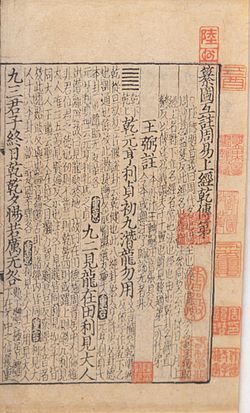I-Ching Quote
Related Quotes
It is as difficult for most poor people to truly believe that they could someday escape poverty as it is for most wealthy people to truly believe that their wealth could someday escape them.
Mokokoma Mokhonoana
Tags:
a breeze, a cinch, a piece of cake, a snap, arduous, arduousness, arrogance, arrogant, back breaking, bankrupt
Japanese universities have a chair system that is a fixed hierarchy. This has its merits when trying to work as a laboratory on one theme. But if you want to do original work you must start young, and...
Kenichi Fukui
Tags:
business, chair system, chemistry, difficult, effort, hierarchy, industry, japan, laboratory, merit
About I-Ching
The I Ching or Yijing (Chinese: 易經, Mandarin: [î tɕíŋ] ), usually translated Book of Changes or Classic of Changes, is an ancient Chinese divination text that is among the oldest of the Chinese classics. The I Ching was originally a divination manual in the Western Zhou period (1000–750 BC). Over the course of the Warring States and early imperial periods (500–200 BC), it transformed into a cosmological text with a series of philosophical commentaries known as the Ten Wings. After becoming part of the Chinese Five Classics in the 2nd century BC, the I Ching was the basis for divination practice for centuries across the Far East and was the subject of scholarly commentary. Between the 18th and 20th centuries, it took on an influential role in Western understanding of East Asian philosophical thought.
As a divination text, the I Ching is used for a Chinese form of cleromancy known as I Ching divination in which bundles of yarrow stalks are manipulated to produce sets of six apparently random numbers ranging from 6 to 9. Each of the 64 possible sets corresponds to a hexagram, which can be looked up in the I Ching. The hexagrams are arranged in an order known as the King Wen sequence. The interpretation of the readings found in the I Ching has been discussed and debated over the centuries. Many commentators have used the book symbolically, often to provide guidance for moral decision-making, as informed by Confucianism, Taoism and Buddhism. The hexagrams themselves have often acquired cosmological significance and been paralleled with many other traditional names for the processes of change such as yin and yang and Wuxing.
As a divination text, the I Ching is used for a Chinese form of cleromancy known as I Ching divination in which bundles of yarrow stalks are manipulated to produce sets of six apparently random numbers ranging from 6 to 9. Each of the 64 possible sets corresponds to a hexagram, which can be looked up in the I Ching. The hexagrams are arranged in an order known as the King Wen sequence. The interpretation of the readings found in the I Ching has been discussed and debated over the centuries. Many commentators have used the book symbolically, often to provide guidance for moral decision-making, as informed by Confucianism, Taoism and Buddhism. The hexagrams themselves have often acquired cosmological significance and been paralleled with many other traditional names for the processes of change such as yin and yang and Wuxing.
